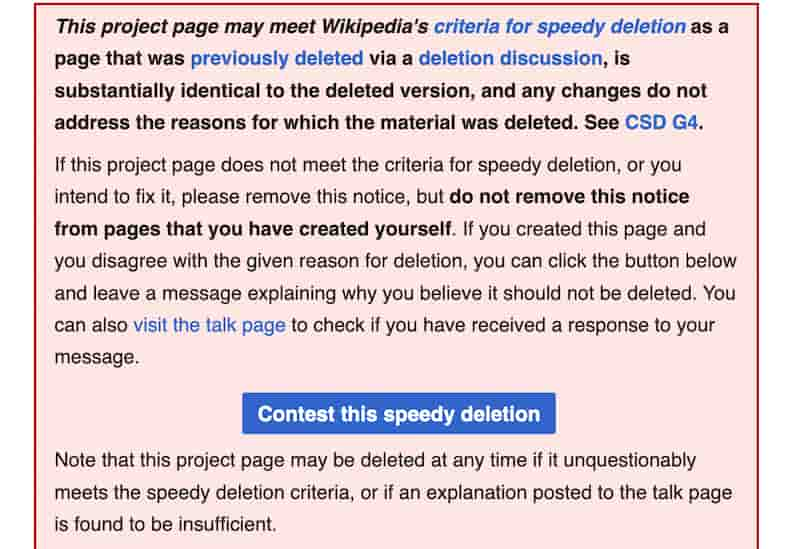Understanding Wikipedia’s Article Deletion Policies

As valuable as Wikipedia is for building brand credibility and visibility, it operates under rigorous policies, especially regarding which articles are kept and which are removed. For businesses and organizations relying on Wikipedia for accurate brand portrayal, understanding these deletion policies can mean the difference between a lasting, authoritative page and one that’s swiftly removed.
Approximately 1,000-1,500 articles are deleted from Wikipedia each day, often within hours of creation. Common causes of deletion include violations of notability, sourcing, or neutrality policies.
| Articles created per day | ~6,000–10,000 |
| Pages deleted per day | ~1,000–1,500 |
| Average time to deletion | Within 1–2 hours |
| % of new pages deleted | Estimated 10–25% |
In this guide, we’ll cover Wikipedia’s deletion policies clearly and practically. We’ll look at the distinctions between speedy deletion and Articles for Deletion discussions, break down what “notability” actually means in Wikipedia terms, and explore how the broader community influences whether an article remains published. If your business’s strategy relies on Wikipedia as part of your online presence—or you’re just tired of puzzling out deletion guidelines after the fact—this guide will cover everything you need to know.
TL;DR
Wikipedia can boost a brand’s visibility—but only if the article survives. Wikipedia has very strict deletion policies to maintain accuracy and neutrality. Articles can be removed through Speedy Deletion (quick removal for clear violations) or Articles for Deletion (AfD), where editors debate if the page meets guidelines.
Key reasons for deletion include:
- Lack of notability (no coverage from independent, reliable sources)
- Promotional tone or conflict of interest
- Poor structure, weak citations, or plagiarism
Even truthful pages can be deleted if they rely on self-published or promotional content. Community consensus plays a major role with editors scrutinizing every word. Respectful, policy-based engagement improves your chances of survival. Even still, a Wikipedia presence is fragile.
Pro tip: Have someone neutral create or edit your article to avoid conflicts of interest.
What triggers an article deletion?
Wikipedia depends heavily on accuracy and trustworthiness, at least from the perspective of the members of the Wikipedia community who focus attention on a particular article. Its policies exist mainly to ensure content is verifiable, impartial, and valuable to the reader community.
Noone is safe from article deletion risks. Even members of popular bands or startup CEOs can fall victim to failing notability guidelines. For example, pages for tech startup founders are often deleted for relying on press releases or interviews instead of independent coverage.
So, what triggers the Wikipedia community to question an article?
- Failing to demonstrate clear notability (a topic’s significance as covered by reliable, independent sources).
- Promotional or overly commercial tone that feels self-serving rather than informative.
- Plagiarism or weak citation practices make the content difficult to verify.
- Poor structure or lack of neutral language undermines Wikipedia’s standard for objectivity.
A Wikipedia page deletion scenario
Let me share a real-world example: A crypto firm recently created its own article about itself, highlighting features and awards (The Marketing Director did it from his home). Even though the facts were true, the page relied predominantly on the company’s press releases, its own website, and promotional content. Further, because the Marketing Director couldn’t help herself, she wrote in a promotional way. Within one day, editors tagged it as overly promotional and insufficiently referenced by independent sources. They also accused the creator of the article of Conflict of Interest (COI), which it was. To top it off, the article was about a company in the cryptocurrency industry — an unpopular industry among many Wikipedia editors.
The ensuing deletion debate, known as an “Articles for Deletion” discussion, concluded that the piece lacked strong independent coverage.

Ultimately, the article was deleted and ended up contacting Reputation X to remedy the situation.
A note about truth in Wikipedia
The truth is important on Wikipedia, but referenceability is more important. Just because something is true does not mean it can be included in an article. In fact, many things that are not true are still included in Wikipedia articles because a prominent publication made a mistake or was unclear about the facts. So, an article may be deleted even though it is true because the references don’t back up the statements made. Furthermore, an editor with an agenda often uses the faulty, yet published, reference as the basis for adding negative things to an article (think: propaganda). This is one of the reasons many people do not feel Wikipedia is reliable.
Speedy deletion vs. Articles for Deletion—what’s the difference?
Businesses navigating Wikipedia often confuse the different types of deletion processes, despite their importance. Here’s a straightforward breakdown:
- Speedy Deletion is almost immediate, and generally happens because of an obvious policy violation. For example, a clearly advertising-focused article or duplicated content copied wholesale from your website won’t stay online for long.

- Articles for Deletion (AfD) involve discussion and a community decision. AfD usually occurs when the issues aren’t as clear-cut and there’s room for debate, such as contested notability or questions about independent sourcing.
Suppose a high-profile start-up has extensive press coverage, but someone creates a Wikipedia article about it that reads like a press release. Editors may flag the page for AfD to debate whether the promotional tone can be remedied or the sourcing improved enough to meet guidelines. Usually, AfD discussions provide room to defend your content and demonstrate how it is consistent with policy, offering more flexibility than speedy deletion.
How notability leads to Wikipedia article survival
Whichever route the deletion discussion takes, the idea of “notability” will inevitably surface. It’s a notoriously tricky concept, but let’s simplify it: For Wikipedia editors, a notable topic is one with clear, significant coverage from neutral, respected, third-party sources. Simply put, it’s not about having a flashy brand or compelling product story—it’s about demonstrating that reliable third parties have independently validated your brand’s relevance. Oh, and when I say brand, I mean a person, a company, a product, etc.
Consider a regional retailer thriving locally but rarely mentioned outside their own marketing channels. A page on Wikipedia is unlikely to survive deletion unless the retailer receives substantial coverage in credible, independent outlets and can point readers to unbiased, verifiable content about their business. Notability protects Wikipedia from becoming filled with companies and individuals who are mostly looking for free advertising, ensuring the encyclopedia remains useful and credible.
Wikipedia isn’t the Yellow Pages.
Community consensus—don’t start fights
Ultimately, whether your article stays alive or vanishes relies in a big way on the views of other Wikipedia editors. Unlike a personal blog or corporate website, Wikipedia content is subject to continuous scrutiny by an active volunteer community, many of whom have strong feelings toward certain kinds of articles.
Rather than thinking of them as gatekeepers, see these editors as independent voices. Some may be for an article, others against. It helps to have other editors on your side who are willing to toss their hat in the ring. Engaging honestly with them—providing substantiated neutral sources and responding respectfully to questions—can significantly improve your chances of article retention. Conversely, antagonistic or dismissive interactions with editors rarely end well.
Take our advice, don’t start fights on Wikipedia.
Pro Tips: Dos and Don’ts of Wikipedia Page Creation
Do:
- Use independent, secondary sources
- Rely on published articles (not interviews or self-written bios)
- Write in a neutral, encyclopedic tone
Don’t:
- Link to your own site/blog as a source
- Use press releases as primary references
- Attempt to write your own page if you have a COI (Conflict of Interest)
Reputation Risk: What a Wikipedia Deletion Really Signals
When a Wikipedia article is deleted, the loss extends far beyond visibility. It carries a reputational signal, one that can undermine credibility.
For individuals and organizations, especially public figures, startups, or niche brands, the absence or removal of a Wikipedia page can convey the message:
“This topic isn’t notable or trustworthy enough to deserve a place in the world’s most-referenced knowledge base.”
That may not be true, of course, but perception becomes reality online.
Why Deletion is a Reputation Risk Multiplier
- Negative Inference Bias: The act of deletion itself may not be visible to the average person, but search engines notice. Wikipedia often appears on the first page of Google for 50–99% of all queries. When that result disappears, the gap signals a loss of authority and may even trigger algorithmic demotion of related pages in the knowledge graph.
- Character Erasure and Reputational Void: According to academic research on character assassination, reputation damage isn’t limited to defamation. Omission is just as potent. Scholars call this “symbolic erasure,” where the absence of expected signals (like a Wikipedia page) becomes a form of reputational attack.
- Knowledge Panel Suppression: Wikipedia content is often a primary source for Google’s Knowledge Panels. If your page is deleted, it may result in suppressed or inaccurate panels, or complete removal of structured entity data from SERPs.
- Narrative Hijacking Risk: Once an article is deleted, the topic becomes vulnerable to being reframed by third parties (think Reddit threads, biased blogs, or press hits) with fewer editorial controls than Wikipedia. Ironically, deleting “promotional” content can open the door to unbalanced negative narratives elsewhere.
Conclusion
When editors challenge your page—asking tough questions about sources, neutrality, and relevance—it’s not an issue that should feel insurmountable so long as you’ve done your homework. Instead, it’s an indication that maybe you need to sharpen your content, reinforce objectivity, and ensure your entry aligns with Wikipedia’s deletion policy. Even though it’s “your” Wikipedia article, it really isn’t. The best way to assure neutrality and notability is for someone else to create or edit the Wikipedia article.
Tags: Wikipedia, Wikipedia Writing.
